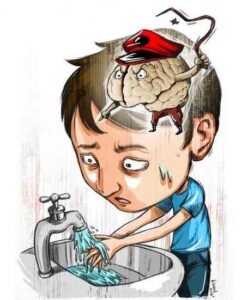Are you constantly worrying about whether or not you have OCD? Do you spend hours upon hours googling “symptoms of pure ‘o’ OCD?” This article will help to determine whether or not you are suffering from the rare form of OCD known as pure ‘o.’ It is important to get an accurate diagnosis if you think that you might be suffering from this condition because treatment options are available! So, what are you waiting for? Keep reading!
Contents
What Is the Pure ‘O’ OCD?
 Pure ‘O’ OCD is a form of OCD where a person experiences obsessions without any visible compulsions. This can make it difficult to spot because the sufferer may not have any obvious rituals or behaviors that they repeat. However, just because someone doesn’t have outward compulsions doesn’t mean they’re not suffering. Pure ‘O’ OCD can be just as debilitating as any other form of the disorder.
Pure ‘O’ OCD is a form of OCD where a person experiences obsessions without any visible compulsions. This can make it difficult to spot because the sufferer may not have any obvious rituals or behaviors that they repeat. However, just because someone doesn’t have outward compulsions doesn’t mean they’re not suffering. Pure ‘O’ OCD can be just as debilitating as any other form of the disorder.
Pure ‘O’ OCD obsession will experience intrusive, unwanted thoughts, images, or urges that cause a great deal of anxiety.
To ease this anxiety, they may engage in mental compulsions. These are repetitive behaviors or mental rituals that they perform in an attempt to neutralize the obsessions and make them go away.
Unfortunately, these compulsions only serve to reinforce the OCD cycle and cause more anxiety in the long run.
For example, a person with Pure ‘O’ OCD may have intrusive thoughts about harming someone they love. In an attempt to make these thoughts go away, they may start compulsively checking on that person or asking others for reassurance that they’re safe.
What Are OCD’s Pure Obsessions?
OCD is a distinct form of anxiety disorder that is characterized by obsessions, compulsions, or both. Obsessions are intrusive thoughts that produce significant anxiety and distress. Compulsions are repetitive behaviors or mental rituals that a person uses to try to reduce anxiety.
People with OCD often have very specific obsessions and compulsions. For example, someone with OCD might be obsessed with germs and contamination. They might compulsively wash their hands or avoid touching door handles.
However, not all people with OCD have such obvious compulsions. Some people with OCD suffer from what is known as pure obsessions, or mental rituals. Pure obsessions are obsessions that do not lead to overt compulsions.
People with pure obsessions often obsess about things like:
- Their health and whether they are sick or not
- The safety of their loved ones
- Natural disasters or accidents happening to them or others
- Sexual thoughts or images that are unwanted and intrusive
While people with pure obsessions do not have overt compulsions, they often engage in mental rituals to try to reduce their anxiety. Mental rituals are repetitive thoughts or mental actions that a person uses to try to ease anxiety.
For example, someone with pure obsessions might obsess about their health and whether they are sick or not. They might constantly check their body for signs of illness or scan medical websites for information about their symptoms. Or, someone with pure obsessions about the safety of their loved ones might repeatedly call or text them to make sure they are okay.
How Can You Take The Pure ‘O’ OCD Test?
 The first step is to consult your psychiatrist or clinical psychologist. If you’re in the US, you can also find a list of qualified mental health professionals on the International OCD Foundation website.
The first step is to consult your psychiatrist or clinical psychologist. If you’re in the US, you can also find a list of qualified mental health professionals on the International OCD Foundation website.
If you think you might be suffering from pure obsessions, take our OCD test below. This quiz is designed to help you identify whether your thoughts and behaviors are indicative of this rare form of OCD.
Do you have intrusive and unwanted thoughts about:
- Your health and whether you are sick or not?
- The safety of your loved ones.
- Natural disasters or accidents happening to you or others?
- Sexual thoughts or images that are unwanted and intrusive?
Are you engage in mental rituals to try to neutralize or reduce your anxiety such as:
- Praying
- Counting
- Repeating words or phrases in your head
- Make sure things are symmetrical or ‘just so’
Do you suffer from any of the following symptoms:
- Depression
- Anxiety
- Sleep problems
- Panic attacks
- Irritability
- Trouble concentrating
- Memory problems
Checking things or any of these activities take up at least an hour of your day or significantly interfere with your daily life.
Please consult a mental health professional for a diagnosis.
Results: If you have answered yes to most of the questions on the OCD test, you are likely suffering from pure obsessions.
What Types of OCD Tests Are Available?
If you’re like most people, you probably think that there are only a few different types of OCD. However, the truth is that there are many different types of OCD, and each one manifests in its unique way. One type of OCD that is often misunderstood is pure ‘O’ OCD.
If you’re suffering from OCD, it’s important to know that there are many different types of OCD tests available. While each one is designed to diagnose a specific type of OCD, they all have the same goal: to help you get the treatment you need.
Here are some of the most common types of OCD tests:
The Y-BOCS Test
The Yale-Brown Obsessive Compulsive Scale (Y-BOCS) is one of the most commonly used OCD tests. It’s a clinical interview that is conducted by a trained professional. The Y-BOCS test covers all aspects of OCD, including obsessions, compulsions, and avoidance behaviors.
The OCI-R Test
The Obsessive Compulsive Inventory-Revised (OCI-R) is another common OCD test. It’s a self-report measure that covers all aspects of OCD. The OCI-R is often used in research studies, as it provides valuable information about the severity of OCD symptoms.
The OCDS Test
The Obsessive Compulsive Driving Scale (OCDS) is a specific type of OCD test that is designed to assess driving-related compulsions. The OCDS covers all aspects of driving, including route planning, checking and rechecking behaviors, and avoidance behaviors.
If you’re suffering from OCD, it’s important to know that there are many different types of OCD tests available. While each one is designed to diagnose a specific type of OCD.
Benefits Of Pure ‘O’ OCD Test
There are various benefits of taking a Pure ‘O’ OCD test.
- Firstly, it can help you to understand whether you are suffering from this rare form of OCD.
- Secondly, it can also help you to identify the triggers and thoughts that lead to your obsessive-compulsive behaviors.
- Finally, it can also provide you with valuable insights into your mental health and how to manage your condition.
If you are suffering from OCD, it is important to seek professional help. A Pure ‘O’ OCD test can be a valuable tool in your journey to recovery. Speak to your doctor or mental health professional about taking a test today.
What Are The Limitations?
It’s important to remember that no test is perfect, and the Pure ‘O’ OCD Test is no exception. There are a few limitations to keep in mind:
- First, the test only covers a limited number of symptoms associated with Pure ‘ O OCD. It’s possible to have this form of OCD without experiencing any of the symptoms on the test.
- Second, the test is not designed to diagnose OCD. If you’re concerned that you may have Pure ‘ O OCD, it’s important to talk to a mental health professional for a diagnosis.
- Third, it is only meant to be used as a general guide. It’s possible to have Pure ‘O’ OCD and not have any of the symptoms on the test, or to have some of the symptoms but not all.
Despite these limitations, the Pure ‘O’ OCD Test is a helpful tool for getting a general idea of whether you may be suffering from this rare form of OCD. If you’re concerned about your mental health, it’s always best to talk to a mental health professional for a diagnosis.
How To Deal With Pure ‘O OCD?
To deal with Pure ‘O’ OCD, it is important to first understand what the disorder is and how it manifests itself. It is a form of OCD that is primarily characterized by intrusive thoughts, rather than compulsions. This can make the disorder very difficult to detect, as sufferers may not exhibit any outward signs of distress.
Here are some suggestions for dealing with Pure ‘O’ OCD:
- Talk to a trusted friend or family member: Talking about your thoughts and feelings can help you to gain a better understanding of what is going on in your mind, and may also help to reduce the intensity of your obsessions.
- Identify your triggers: What are the things that make your OCD worse? Once you know what these are, you can try to avoid them or deal with them more constructively.
- Challenge your thoughts: When you have an intrusive thought, try to question it. Why am I thinking this? Is there any evidence to support it? This can help to weaken the hold that your OCD has over you.
- Expose yourself to your fears: This may sound counter-intuitive, but gradually exposing yourself to the things that trigger your OCD can help you to overcome your fear. Start with something that is only slightly anxiety-provoking and work up from there.
- Practice relaxation techniques: This can help to reduce the overall anxiety that you are feeling, and may also help to lessen the intensity of your obsessions.
Seek professional help- If you find that you are struggling to cope with your OCD, it may be helpful to seek professional help. A therapist can provide you with support and guidance as you work to overcome your disorder. For instance, Cognitive Behavioral Therapy is an effective treatment for OCD and medications will be prescribed by a doctor or professional.
With the right treatment, you can learn to manage your disorder and live a full and happy life.
Only a qualified mental health professional can give you a definitive answer as to whether or not you are suffering from this disorder.
Conclusion
To conclude, the Pure ‘O’ OCD Test can be a helpful tool in determining whether or not you are suffering from this disorder. However, only a qualified mental health professional can give you a definitive answer. If you think you may be suffering from this disorder, seek professional help. With the right treatment, you can learn to manage your disorder and live a full and happy life.
For further information and suggestions, please contact Therapy Mantra. We have a team of expert therapists that can help you overcome this problem. Get in touch with us right away to learn more about our services. You may also make an online therapy session or download our free Android or iOS app.


